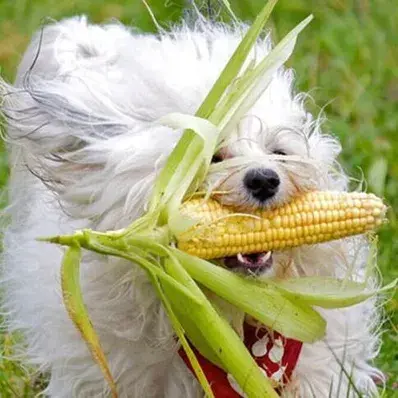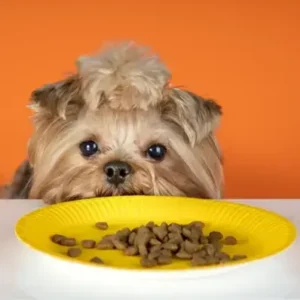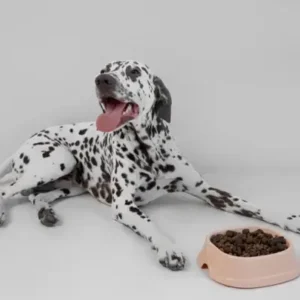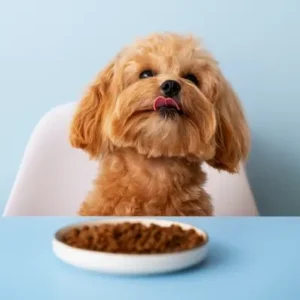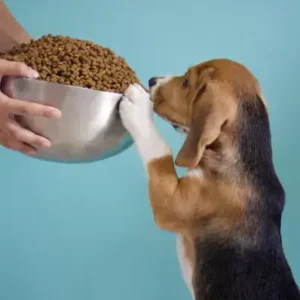Nutritional Benefits of Corn
Corn is good for dog breeds when served plain and in moderation.
Here are some nutritional benefits:
- Fiber: Promotes gut health.
- Vitamins and Minerals: Corn contains vitamins such as B-complex vitamins, iron, magnesium, and potassium.
- Carbohydrates: Provides a quick energy boost, ideal for active dogs.
- Protein: Corn is a good source of protein.
- Linoleic acid: An essential omega-6 fatty acid in corn, supports healthy skin, coat, and immune function in dogs.
Despite these benefits, corn should never replace a balanced dog diet and should only be an occasional addition.
Potential Risks of Feeding Corn to Dogs
While corn has its advantages, there are potential risks to be aware of:
- Choking Hazard: Corn cobs are dangerous and can cause choking or intestinal blockages, which may require emergency surgery.
- Food Allergies: Although uncommon, some dogs may be allergic to corn, leading to symptoms like itching, vomiting, or diarrhea.
- Weight Gain: Corn is high in carbohydrates, so overfeeding can contribute to obesity.
Forms of Corn: What’s Safe and What’s Not?
Let’s take a closer look at the different forms of corn. We’ll determine which ones are safe for your dog to enjoy.
Can dogs eat corncakes?
Dogs can have plain, unsalted corn cakes in small amounts. However, most commercially available corn cakes contain added salt, sugar, or artificial flavorings that are not safe for dogs. Always check the ingredients and avoid any harmful additives.
Can dogs eat corn tortillas?
Plain corn tortillas are generally safe for dogs in small quantities, but they offer little nutritional value. Avoid giving your dog tortillas if they contain added spices, salt, or other seasonings.
Can dogs eat cornflakes?
Plain cornflakes can be given occasionally, but they often contain added sugar and sometimes salt, which are not ideal for dogs. Always opt for unsweetened and unflavored varieties, and only in moderation.
Can dogs eat corn on the cob?
No, dogs should not eat corn on the cob. While the kernels themselves are safe, the cob poses a serious choking hazard and can cause intestinal blockages, which might require emergency surgery.
Can dogs eat corn chips?
Corn chips are not recommended for dogs. They are usually high in salt, oils, and artificial seasonings, which can be harmful and may lead to digestive upset or long-term health issues.
How to Safely Serve Corn to Your Dog
By following these simple steps, you can ensure that your dog enjoys corn safely and healthily.
- Remove Corn from the Cob: Always separate kernels from the cob to prevent choking.
- Cook Plainly: Boil or steam the corn without adding salt, butter, or spices.
- Serve in Small Quantities: Stick to small portions as an occasional treat to prevent overloading on carbohydrates.
Signs of Allergic Reactions or Digestive Issues
If you suspect your dog is experiencing any of the following symptoms after feeding your dog corn, consult a veterinarian immediately:
- Dehydration
- Fatigue or lethargy
- Decreased appetite
- Persistent diarrhea
- Low energy levels
- Frequent vomiting
Alternatives to Corn for Dogs
If you’re unsure about feeding corn to your dog or want to try other options, here are some safe and nutritious alternatives:
- Carrots: Low-calorie and high in vitamins.
- Green Beans: Great for fiber and vitamins.
- Sweet Potatoes: A healthy source of carbohydrates and antioxidants.
- Pineapple: Packed with vitamins and enzymes that support digestion.
- Oranges: Rich in vitamin C and a refreshing, hydrating treat.
Corn can be a safe and tasty treat for your dog when served plain and in moderation. Avoid corn on the cob and processed corn products, and always be mindful of your dog’s individual dietary needs. If you’re ever in doubt, consult your veterinarian for advice tailored to your pet’s health.

